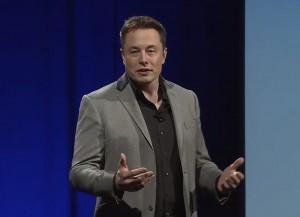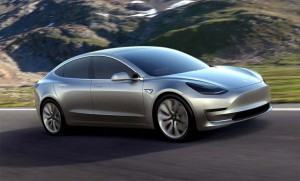With strong early demand for the Tesla Model 3 and still more new products in the pipeline, Tesla may need anywhere from three to “possibly as many as 10 or 20” new assembly plants, CEO Elon Musk told shareholders during an annual shareholders meeting that took on the air of a superstar love fest at times.
With shouts and applause for the charismatic company founder and entrepreneur, shareholders largely gave Musk what he wanted, among other things rejecting a pension fund proposal to make Tesla board members have to stand for re-election annually, rather than every three years. The issue of high worker injuries rates also came up, however, though a pending sex discrimination lawsuit was not a topic during the event’s question-and-answer session.
The 2017 stockholders meeting comes at a critical time for Tesla. Though the company has turned a profit during only two quarters since going public, its share price has been soaring, buoyed by early expectations for the Model 3, its first mainstream model, which appears ready to go into production next month.
Tesla has so far taken in more than 400,000 advance reservations – each with a $1,000 deposit – since announcing the compact battery-electric sedan in March 2016. And Musk has been promising to punch out 500,000 vehicles from the company’s Fremont, California, assembly plant next year, a figure that would also include about 100,000 older and more expensive Model S sedans and Model X utility vehicles.
(Musk predicts Tesla will build 100K vehicles in 2017. Click Here for the story.)
At that pace, Tesla would push to the limits for the factory which was original designed for General Motors and then operated as a joint venture between GM and Toyota. Fremont closed shortly after the Detroit automaker emerged from bankruptcy in 2010 and then sold to Tesla.
The Model 3, according to Musk, will mark the transition from niche to mainstream manufacturer, but he discussed other products in the pipeline during the shareholders meeting, including the heavy-duty truck Tesla plans to unveil in September, as well as the electric pickup truck that will follow.
“Maybe there’s a little more than we’re saying here,” he hinted. “Could be.”
Tesla is widely expected to also add a compact electric SUV, a downsized and lower-priced version of the Model X which is expected to be called the Model Y. But unlike earlier expectations, it apparently won’t share the same platform of the Model 3. Using separate underpinnings would translate into higher costs and more challenges on the production line, analysts worry.
Tesla learned a hard lesson, however, initially trying to make the big Model X a ute version of the original Model S. That resulted in major changes along the way that set production back by two years. The utility vehicle continues to have significant quality issues and Musk didn’t deny the challenges when he described the Model X as the “Faberge egg of cars, that likely could not, and should not, be built again.”
(Click Here to see what was behind Tesla’s bigger-than-expected Q1 losses.)
In the year since shareholders last met, Tesla has gone through some significant changes. Among other things, it completed the acquisition of energy company SolarCity, launching a new line of solar roof tiles. Construction of the Tesla Gigafactory in Nevada has moved forward and production of batteries for stationary generators has already gotten underway.
Tesla has also raised more money from investors who have rewarded it with a stock price that has risen to $352.85 at the close of trading on Tuesday – not only a record, but also a roughly $100-a share increase during the past three months.
During the shareholders meeting at the Computer History Museum near Tesla headquarters in Palo Alto, California, a proposal to make board members stand for re-election every year was rejected, as Musk had hoped. They will continue to have to stand just every three years.
Despite the love-in tone of the meeting, however, Tesla officials were asked about reports of high injury rates at the Tesla Fremont plant. As TheDetroitBureau.com recently reported, rates have been substantially higher than at most other U.S. auto factories – though Tesla has responded that the injury numbers have fallen sharply in recent months.
One topic that did not come up was the firing of 33-year-old A.J. Vandermeyden, a Fremont worker who had filed a lawsuit alleging sex discrimination by Tesla. Her lawyer, Therese Lawless, told the British newspaper, The Guardian, that the move was “clear retaliation,” and that “they’ve just proven our case.”
(To see more about how Tesla workers are injured “on a regular basis,” Click Here.)
She added that “Somebody is trying to instill in employees that when they speak out about matters they are legally allowed to speak out about, they too will be fired.” The case comes at a point when Tesla is also trying to head off a drive by the United Auto Workers Union to organize workers at Fremont.


